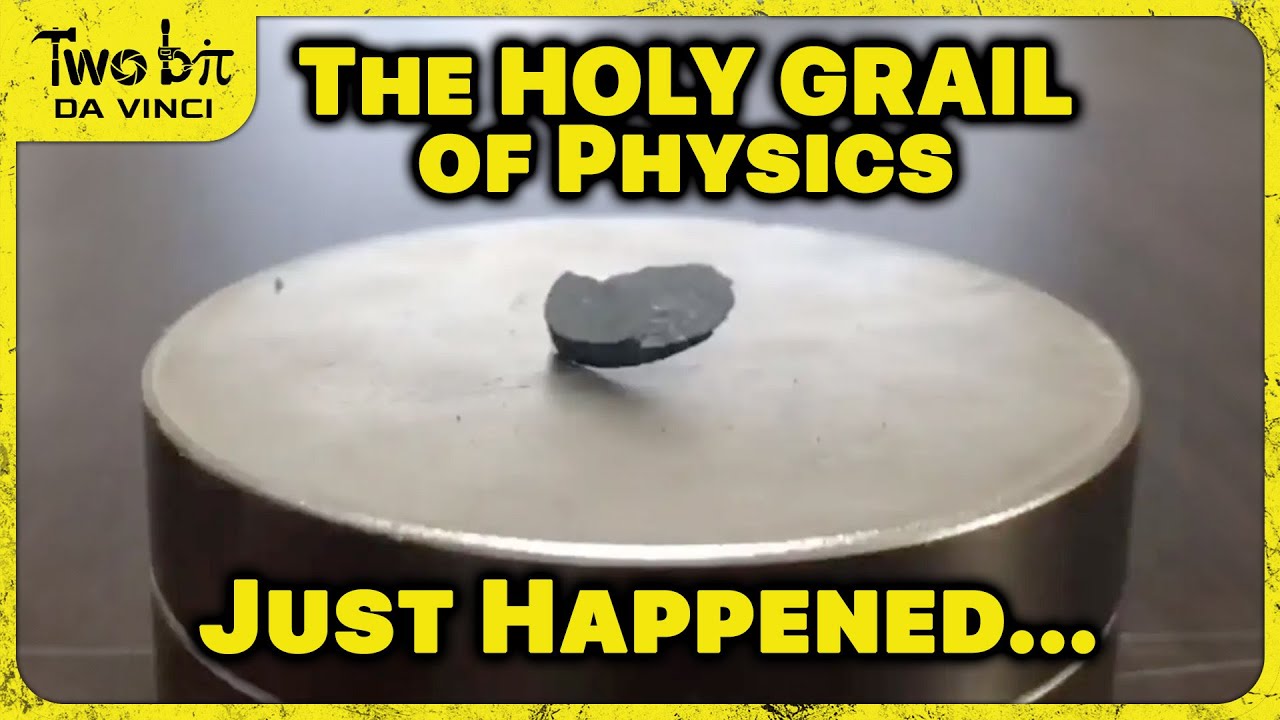JUST HAPPENED!!1!11
I’ll believe it when its not just youtube clickbait.
I mean, publishing on youtube gets more viewers than publishing in a scientific paper
I’m not sure that “number of eyeballs” is the metric by which a successful scientific discovery should be judged…
Nonsense; this is the future.
Everything is shit in the future!
You’re right, of course, but more eyeballs can lead to more sponsorship and more money, which leads to a greater chance of succes. Downside is that you’ve picked the commercial road and you’ll probably end up in the pocket of some Nestle or Shell.
It’s not just youtube clickbait, were you not aware of this news before this video?
No I wasn’t. Source?
If you do a Google search for LK-99 you’ll see a whole pile of news articles from the past two days. A preprint was posted on arXiv and everything exploded. There are labs all over the world working on reproducing the material and testing it right now, and it’s a pretty simple thing to make so we’ll have a solid answer likely within a week.
deleted by creator
Everything I’ve seen says that the 2020 paper was rejected, not falsified. It had been submitted to Nature shortly after Diaz’s now-likely-fraudulent superconductor research had been accepted and turned out to be controversial, so it’s understandable that Nature was gun-shy of superconductor papers. Do you have any references to its falsification? A paper can be rejected for many reasons other than falsification, indeed I would think most rejections are not for that since peer review doesn’t include independently replicating the results.
What it feels like to me is that the authors were panicking over the possibility of getting “scooped.” They’ve been working on this stuff for decades and had often gone without funding so that seems like less of an urgent concern to me.
deleted by creator
An initial paper was submitted to Nature in 2020, but rejected.[10] Similarly-presented research on room-temperature superconductors by Ranga P. Dias had been published in Nature earlier that year, and received with skepticism—Dias’s paper would subsequently be retracted in 2022 after its data was found to have been falsified.
Emphasis added. The paper that had falsified paper was by a different researcher and was about a completely different putative superconductor. Only Dias’ paper appears to be based on falsified data. There’s no indication that the LK-99 paper is based on falsified data. Unfortunately LK-99 is suffering guilt by association simply because both of these things are about room-temperature superconductors, but they share nothing in common with each other beyond that broad topic.
Very cool!
It would be cool if these YouTubers could wait til the paper was peer reviewed and its results replicated before shooting their mouth off
For people put off by the shitty title, the video is actually really good and comprehensive, and sets realistic expectations. It’s a shame that these garbage clickbaity titles are a thing.
Being a content creator these days is not easy! I forgive him for the clickbait.
Agreed! If it lets people like this guy make videos like this, a little clickbait isn’t so bad. I just wish they’d phrase titles slightly differently, like “THIS COULD CHANGE EVERYTHING” would still draw eyes without being a lie.
I found the arxiv papers more interesting, but it’s not a bad divulgation video.
Not to be snobbish or anything, but at this juncture I wouldn’t trust anyone who can’t pronounce
arXiv(orSchriefferfor that matter) correctly to explain room temperature superconductivity to me. Hell I barely believe anyone with a materials/physics degree…Doing that cute “X is chi” thing TeX does is kinda obvious but I have to tell you that it’s probably you who’s pronouncing Schrieffer wrong. Because Americans can’t pronounce German names, not even their own.
Also just wait until your hear the takes economists will have. They’re going to set the record for how many fields a single statement can be simultaneously wrong in (including, of course, their own).
The point is there are established conventions among the practitioners on how these are pronounced, and not getting them right says something about the youtuber who may otherwise appear as an expert.
You might be right on how the name ‘Schrieffer’ should be pronounced in its original tongue, but I’ve heard multiple former students and colleagues of Bob Schrieffer pronounce it otherwise to conclude that theirs is probably how Schrieffer himself intended his name to be pronounced.
Yeah, can’t wait to hear economists’ take, or The Economist’s…
I don’t see where the person you’re responding to said they’re American
John Robert Schrieffer, one of the original superconductivity guys, is American.
juncture
at this junction, you mean! wink wink
Hi
JoeBrian
We get one of those about once a year, and none of them have been replicated yet.
Yes, see… it stops working when it leaves their lab.
Then we should build a huge battery right there in their lab and let it store energy for the whole world.
Did it even work in the lab? Replication is needed, otherwise they might have had something else happen. For that matter even if it really happened, if it can’t be duplicated it changes nothing
Will it turn out to be legit, or will it be this generation’s cold fusion?
I recommend looking at the summary on Wikipedia. See the “Response” and “Publication History” sections: https://en.wikipedia.org/wiki/LK-99#Publication_history
Similar research has been falsified, the third author of this paper left the university months ago, some authors filed patents on the material years in advance, and the underlying mechanisms haven’t been thoroughly explained.
However, they presented it in a way that is EXTREMELY straightforward to reproduce. There’s even a live stream on Twitch of someone working on it: https://www.twitch.tv/andrewmccalip So I doubt they’d make a claim that large when it’s so easy to disprove, and we’ll know for sure in a matter of days, most likely.
Related to what you’ve posted, the Wikipedia article on room temperature superconductors has a decent history on other claims, which have all turned out to be false or only usable in very specific circumstances: https://en.m.wikipedia.org/wiki/Room-temperature_superconductor
If this gets peer reviewed and confirmed, what would that mean? What applications would this material have?
what I can think of
No resistance => faster tech, less temp in tech
Hovering things, especially for public transportation
Cheaper mri
Also conserve helium, which would be huge.
Remote power generation becomes much more useful since you can eliminate transmission losses. Things like covering the Sahara with solar panels to sell energy to Europe become possible to think about.
Maglev could become more common and more effective, but a “no-limit” battery comes to mind (no resistance=infinite charge) which could make each city or nation own an endless reservoir of energy. Goes well with renewables.
Those are just 2 ideas. I’m sure there will be a lot more.
EDIT: ignore the “no limit” battery, that’s a mistake. I mixed resistance with charge and made a stupid and wrong statement.
How does no resistance lead to infinite charge? I can see it having approximately infinite conductivity sure, but charge? how?
Battery chemist here. That guy has no idea what he’s talking about.
Yeah I mixed up resistance with charge, superconductors are probably meaningless for batteries.
Sorry, i confused the lack of energy loss from resistance to “charge”, so I’m wrong.
It might be more relevant for semi conductors in order to save energy. Maybe railguns.
that’s… not how this works
I see your edit but in case you’re interested - a capacitor is technically a 0 resistance battery for DC.
everything uses copper wire and want to reduce resistance can use superconductor.
Everything. Instant prize too
Call me when its 5 sigma.
This discovery has potential. At least it’s not a totally exotic process to make this LK-99. I bet more researchers are going to jump on it and explore how it will work and where its limitations are.
The click-baityness is a little off-putting about this video. This doesn’t solve everything, but it’s possibly a big leap in the field of superconductors.
Yes, not so fast. Only if other teams can replicate LK-99 and they can confirm room temperature super conductivity will it be time to say that this changes something.
The Wikipedia for LK-99 is fairly solid… https://en.m.wikipedia.org/wiki/LK-99
260° F?!
If that’s true, this would be a huge fucking deal. But most room temperature superconductors don’t operate anywhere near what laymen would call room temperature.
room temperature superconductors don’t exist. (well… when/if this paper turns out to be bullshit)
High Temperature Superconductors do, and refer to the fact that they can be cooled with liquid nitrogen, and do not require liquid helium.
“well actually” room temperature superconductors do exist, quite definitely! … But only at 100 gigapascals of pressure. https://uspex-team.org/static/file/Troyan2022_ufn227g_High-temperature superconductivity in hydrides.pdf
Still really cool, but not useful for engineering.
I agree that this paper needs to be replicated before we get excited.
damn, right.
i totally forgot about those, and assumend the mix-up of room temperature and “high-temperature”, because “high” is very relative and confused me as well.
Turns out we were putting Lead into the wrong thing all along.
But the guy who put lead into gasoline proved how it wasn’t poisonous, even washed his bare hands in it! (then died from totally unrelated lead poisoning)
So actual hover boards soon?
Superconducting skateboard looks like a reality.
deleted by creator















